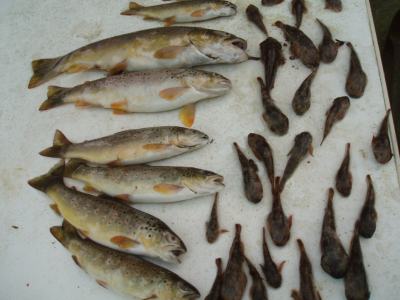Officers from the Environment Agency are investigating a pollution incident involving the death of more than one hundred fish in the Ginge Brook in Drayton, Oxfordshire.
The Environment Agency were notified by a member of the public yesterday (Sunday) after they spotted dead fish floating along the Ginge Brook, a tributary of the River Thames. The affected fish included stickleback and trout.
This is the second major fish kill in Oxfordshire which officers from the Environment Agency have investigated in the past week. A hundred fish including brown trout and bullhead – which are both protected species under European legislation – were killed in a separate pollution incident on the Shill Brook in Carterton last week.
Officers are now investigating the causes of both incidents, which are not linked.
Senior Environment Officer Steve Wilkes said: “We are investigating the possible cause of the latest fish kill in Drayton, and fisheries and environment officers are currently on site assessing the full impact of the incident. The potential source of the incident has been identified and stopped.
“We believe that some of the chemicals have entered the Ginge brook. The Health Protection Agency has been notified. Should any members of the public have concerns for their health, they should contact their local environmental health department.
“Farmers are advised to take a precautionary response and prevent livestock from drinking directly from the Ginge Brook or River Thames between Culham and Appleford for the next couple of days.
“This is the second significant fish kill we have seen in Oxfordshire in the past week, and it highlights just how serious for fish and wildlife it can be when pollutants get into local watercourses.
“We would ask anyone who sees dead fish, fish in distress or pollution in streams or rivers to call our emergency hotline on 0800 80 70 60 immediately – even if you think someone else may have already notified us, please give us a call.
“Our officers are continuing to assess conditions along the river, but it will take some time for us to determine the full environmental impact.”
Members of the public can report pollution incidents by calling the Environment Agency’s emergency hotline on 0800 80 70 60.












